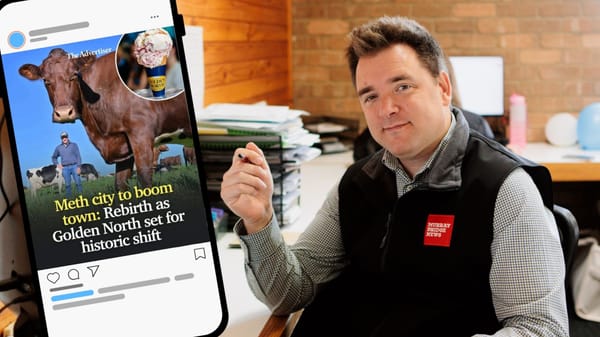‘Aunties’ house’ could give roaming kids somewhere to go
Earlier intervention is needed to give Murray Bridge's preschoolers the best chance in life, service providers say.

This post about a community cause is free to read. Your support can help Murray Bridge News tell more important local stories – subscribe today.

Children as young as five are being left to roam the streets of Murray Bridge, or neglected or abused, a community forum has heard.
They need somewhere safe to go – and a visiting sociologist thinks she might have a solution.
Elspeth McInnes was among the speakers at last Thursday's Flourish by Five forum, which focused on preschool-aged children and the support available to families in Murray Bridge.
She shared her dream of a service that could meet those children’s needs, modelled after the successes she had seen in Aboriginal communities.
“I’ll call it an aunties’ house, in recognition of First Nations people’s model,” she said.
“If you have a kinship claim with an aunty, you lob onto her doorstep, whatever time of day or night, and say ‘aunty, will you help me?’ and aunty will.
“She might be living in a Housing Trust house that’s falling down, she might have a heart condition, she might have half a pension left ... but she’ll take that child in and she’ll do her best to keep that child safe.”
The service would be something like a community drop-in centre, but open 24-seven.
It might be housed in purpose-built premises, or a remodelled childcare centre, with clear sight lines, a kitchen, spaces for sleeping and relaxing and a garden.
Its staff would have a broad range of skills.
Visitors would be able to get a meal, perhaps swap clothes or toys, build relationships and form support networks.

Who would pay for it?
That was not as big a problem as you might think, Professor McInnes said.
“If a community decided it wanted it, and organised to make it happen, there are the resources,” she said.
“It’s not like this community lacks people of goodwill, people with skills and expertise; it’s about putting those together in an intentional way.”
Police Superintendent James Blandford said the need for such a service was plain.
“At the moment, the only way I can get (children) help when they’re really off the rails ... is to criminalise them through the Youth Court and put them in Cavan (the Adelaide Youth Training Centre),” he said.
“Children ... are acting out the most horrific behaviour and are so victimised, so traumatised, that they are going to die.
“Sooner or later someone’s going to have to stand up to the coroner, and the front page of The Advertiser, and explain why.”

Early intervention is key
Professor McInnes’ idea was an extension of a broad theme at the forum: that authorities waited too long to engage with struggling families.
In an ideal world, service providers would intervene long before children were traumatised and put into care, said Shane Maddocks, the chief executive of community agency AC Care.
“Trying to fix broken kids ... is really hard,” he said.
“When kids have suffered extreme trauma, it’s really hard to support them and get them to have some faith that the world is going to keep them safe, (and to) keep them out of jail, keep them out of homelessness, keep them out of the mental health system.
“We have to get in earlier.”
Making a change was not about blaming bad parents, he suggested, but about supporting people who had struggled to develop parenting skills, often because of past trauma in their own lives.
“I haven’t met a parent yet who doesn’t want their kids to grow up strong and happy,” he said.
“But ... circumstances get in the way.”

‘There is a conversation to be had’ about irresponsible parents
Meanwhile, Superintendent Blandford said there was a conversation to be had about whether people should be allowed to bring children into the world if they are not prepared to be parents.
“There is no check ... to see if people are able to have a child (in their care),” he said.
“You have to have a license to have puppies, or cats, but not to keep turning out children without responsibility.”
There was no “black-and-white” answer, he said.
But the problem existed, and it affected those children throughout their lives.
Mr Maddocks said there was one way people could help right now: by becoming foster carers.
AC Care fielded 400 care requests from the Department for Child Protection every month, he said, including more and more infants.
More often than not, because there was a shortage of foster carers in regional South Australia, those children wound up being sent to Adelaide and never came back.
“If you know anyone with a spare bedroom and the ability to look after children, I’m begging you, come and talk to us,” he said.
- Get help: Contact AC Care on 8531 4900 or at 29 Bridge Street, Murray Bridge for more information about the HIPPY program, which helps parents of children aged four and five get ready for school, or the Communities for Children program, which offers activities for children aged 5-12; or contact your nearest childcare centre or community organisation.
- Have your say: Make a submission to the state Royal Commission into Early Childhood Education and Care by visiting yoursay.sa.gov.au/royalcommissionecec, emailing royalcommissionecec@sa.gov.au or writing to GPO Box 11025, Adelaide SA 5001.
- More information about becoming a foster carer: Call 1300 2 FOSTER (1300 236 8737), call or visit AC Care or visit www.accare.org.au.
- Read more: HIPPY program shows early childhood activities have a life-long impact
Your support can help Murray Bridge News tell more important local stories – subscribe today.





